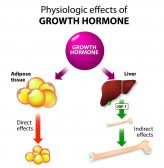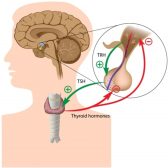Definition
noun, plural: agglutinins
Any substance, usually of biological origin, that causes agglutination or clumping together of cells (e.g. red blood cells) or of bacteria
Supplement
An agglutinin refers to any substance that causes agglutination (“clumping together”) of cells. For instance, certain antibodies can cause antigens to aggregate. Antigens, such as foreign microbial agents, attach to the antigen-binding sites of antibodies.
Another example of the function of agglutinins is associated with blood group. Agglutinins in the blood plasma are responsible in making sure that there will be blood cells of only one blood type circulating in a person’s body. If blood cells of a different blood type enter the body, agglutinins cause agglutination and destruction of these blood cells. For example people with blood type A have agglutinins b in their blood plasma. Hence, blood transfusion of blood type B will cause agglutinins b to react with the cells and cause agglutination.
Lectins can also serve as agglutinins. Lectins are proteins that have binding sites for sugar. Similar to antibodies, lectins have the ability to cause agglutination of red blood cells.
Word origin: agglutin(ation) + –in
See also:
Related term(s):







